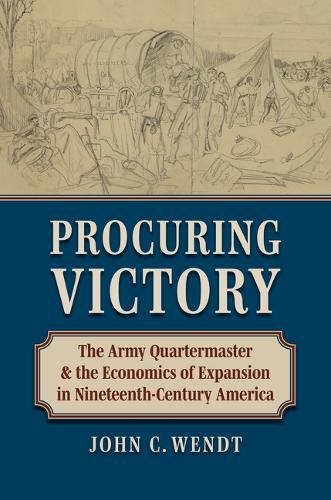Readings Newsletter
Become a Readings Member to make your shopping experience even easier.
Sign in or sign up for free!
You’re not far away from qualifying for FREE standard shipping within Australia
You’ve qualified for FREE standard shipping within Australia
The cart is loading…






A groundbreaking study of U.S. Army quartermasters during the wars of the nineteenth century. Historian John Wendt shows how the federal dollars exchanged between military personnel and civilians underwrote American expansion and had profound effects on the course of American military, economic, and social history.
The United States Army of the nineteenth century has been called many things-"conquerors," "constabularies," "peacekeepers," and "professionals," among others. Yet, despite spending hundreds of millions of dollars throughout the rapidly growing United States, rarely has the nineteenth-century Army ever been seen as a business. The Army's quartermasters were almost entirely reliant on local banks, merchants, and markets to supply campaigns across North America, including the Second Seminole War, the Mexican-American War, and the Civil War, From this novel vantage point, John Wendt stitches together seemingly disparate military and economic events into a coherent narrative of military spending across the mid-nineteenth century.
The Army's Quartermaster Department served as the Army's chief military logistics agency, responsible for procuring transportation, clothing, and food. One quartermaster in particular, George Hampton Crosman, served in the department for nearly four decades of military campaigns, territorial expansion, and institutional transformation. Wendt allows readers to see through Crosman's eyes how North American regions on the fringe of warfronts navigated the economic realities of financial crisis, western expansion, and industrialization. Significantly, he uncovers new insights into the numerous written and unwritten rules that governed the financial, logistical, and moral terms of civil-military relationships and sheds light on the individuals who quietly shaped the arc American history.
$9.00 standard shipping within Australia
FREE standard shipping within Australia for orders over $100.00
Express & International shipping calculated at checkout
Stock availability can be subject to change without notice. We recommend calling the shop or contacting our online team to check availability of low stock items. Please see our Shopping Online page for more details.
A groundbreaking study of U.S. Army quartermasters during the wars of the nineteenth century. Historian John Wendt shows how the federal dollars exchanged between military personnel and civilians underwrote American expansion and had profound effects on the course of American military, economic, and social history.
The United States Army of the nineteenth century has been called many things-"conquerors," "constabularies," "peacekeepers," and "professionals," among others. Yet, despite spending hundreds of millions of dollars throughout the rapidly growing United States, rarely has the nineteenth-century Army ever been seen as a business. The Army's quartermasters were almost entirely reliant on local banks, merchants, and markets to supply campaigns across North America, including the Second Seminole War, the Mexican-American War, and the Civil War, From this novel vantage point, John Wendt stitches together seemingly disparate military and economic events into a coherent narrative of military spending across the mid-nineteenth century.
The Army's Quartermaster Department served as the Army's chief military logistics agency, responsible for procuring transportation, clothing, and food. One quartermaster in particular, George Hampton Crosman, served in the department for nearly four decades of military campaigns, territorial expansion, and institutional transformation. Wendt allows readers to see through Crosman's eyes how North American regions on the fringe of warfronts navigated the economic realities of financial crisis, western expansion, and industrialization. Significantly, he uncovers new insights into the numerous written and unwritten rules that governed the financial, logistical, and moral terms of civil-military relationships and sheds light on the individuals who quietly shaped the arc American history.